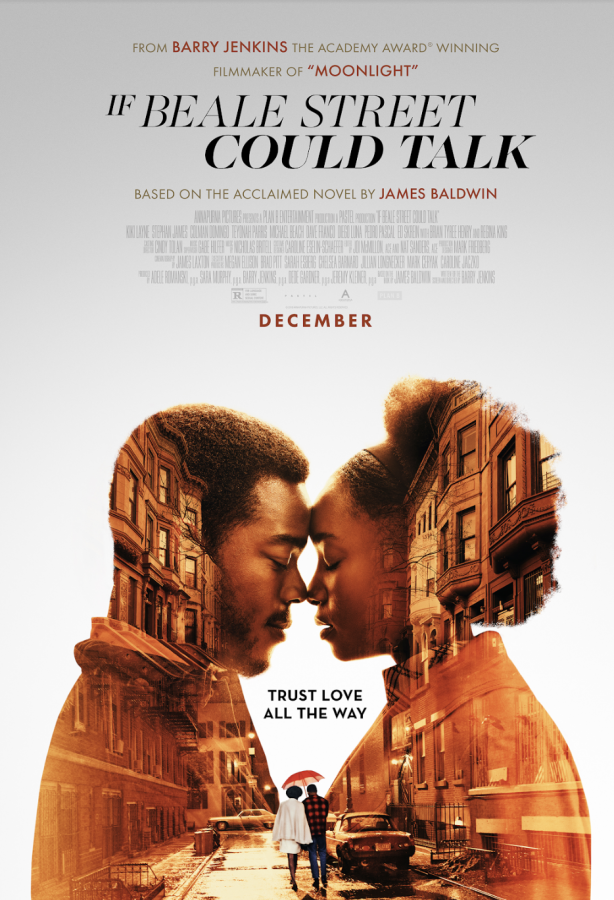If Beale Street Could Talk aptly captures the human emotion in Harlem during the 70s
January 24, 2019
In streets where prejudice and hate mar love and tenderness, there are no heroes to prevent the flood of darkness that overtakes James Baldwin’s Harlem in the early 70s in his novel If Beale Street Could Talk. Introducing childlike friends and now passionate lovers Tish and Fonny as they scout a future for themselves in New York City, Baldwin feverishly depicts the injustice of allegation as Fonny is accused of rape while Tish and her family are left to protect him and their future together.
Adapting this novel to the big screen, Barry Jenkins (Moonlight) is perhaps the only director capable to deliver a powerful and captivating film worthy to call itself an adaptation of Baldwin’s work. Deliberately slow to capture the pace of life with its loving shots of Tish and Fonny as they grow up to understand one another, Jenkins captures the trust and respect this young couple shares.
As they walk hand in hand, never letting go, the audience realizes Tish and Fonny are seemingly the only ones in the world. Both have given up themselves to be with the other, both souls intertwining to become one entity that walks on Beale Street and talks on Beale Street, and more importantly, lives on Beale Street. The street is reminiscent of Spike Lee’s Crooklyn as the street shapes the characters living on that block with its noise of life. It is life itself in its truest form, and it takes true auteurs to capture this blessed livelihood.
Jenkins is such an auteur, proving himself once again capable of delivering powerful films touching on race and love as he directed the 2017 Academy Award Winner for Best Picture Moonlight.
Not only should Jenkins’ style and precision be acclaimed, but so should the acting. Regina King is triumphant in the role of a mother wanting to see her daughter happy in a world not offering any love to black folks. Along with King, Stephan James is a delightful actor to witness on the screen as his voice carries through the wind in a soft yet powerful hum.
In a break-out performance, Kiki Layne is resonantly beautiful as the girlfriend of James’s character Fonny as he is wrongfully put in prison as she is left to protect and thrive with her family without her best friend and lover. Coupled with Jenkin’s directing and script, these actors transform this film into better glory.
However, though I acclaim this film (as do critics with a Rotten Tomatoes score of 95 percent), it does not deserve all the praise critics and audiences have awarded it. 2018 was a great year for film as Hollywood delivered some of the finest films of the decade spanning different genres such as Private Life, The Favourite, Hereditary, and Roma, but was it the best of the year? Certainly not. And while I do not wish to claim a certain film excelled over all others, If Beale Street Could Talk is not the film to hold the title of best film of the year. Jenkins delivered a powerful film that resonates with audiences, and its topics of race and love are especially universal with the current political climate surrounding all the streets in the world. However, at times, the camera seemed too aesthetically pleasing, trying to appear sensual and life-impacting while just being plain and bland. Jenkins may stand behind the camera lovingly embracing his film, but I cannot say it totally rings true. Shots of Tish’s and Fonny’s faces are constantly used, but at a certain point, we just start to acknowledge them as… close-ups. No trick of the lens to get the audience to realize the love shared between these two, just an overused camera placement.
Besides the camerawork, the acting felt artificial at times; needless to say, these are talented actors behind the cast. However, characters seemed to be stereotyped based on race; Jenkins then alters the audience’s perception of races by showing a gentler side of their humanity. This is a wonderful thing, this full acknowledgment of humankind as being sensitive and yearning for connection, but repeatedly using this does not make it a tool to build a fantastic film. Indeed, this portrayal of humanity is overplayed and it makes the film sink, sink, sink. Unfortunately, this is the case for If Beale Street Could Talk.
Even as I dissect this film and its directing and acting, it certainly is one of the finest films of the year as Tish and Fonny are relatable in their passion and struggles. Jenkins creates a world known to every man, Beale Street acting as a place for the common man to rest and work. Though injustice plagues Tish and Fonny’s future, nothing outlasts hate more than love.
No matter how one leaves the theater after watching this film, the message of love is carried heavily in one’s heart as we experience the most beautiful aspects of human emotion. When a film is capable of such a feat, audiences know they witnessed true art. If Beale Street Could Talk is emotionally wrecking and while all the praise is forthcoming and perhaps magnified, the love present in this film deserves to walk alongside the people of Beale Street, the people of the common street.
Jenkins, you’ve done it again.




